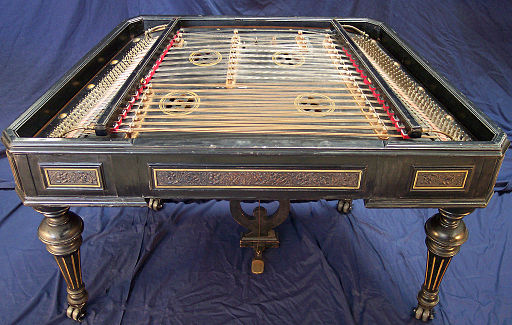
Tempesta’s upcoming program Women of Antiquity includes three arias by Georg Reutter, that call for a special instrument, the “salterio”, a hammered dulcimer whose name comes from the same root as “psaltry” in English.
What precise form of dulcimer Reutter had in mind was unclear. That is because the Italian-baroque, art-music instrument called salterio has too small of a range to play many of the notes in two of the Reutter arias. But if “salterio” is used in its generic sense, the way “hammered dulcimer” can in English, then more possibilities enter the fray.

Another form of hammered dulcimer that had some currency in Reutter’s day is the pantalon, invented by Pantaleon Hebenstreit (1668–1750) of the Dresden Hofkapelle. It was a big instrument that had all the notes in those arias. We do know who played these parts in Vienna: the dulcimer virtuoso Max Hellmann (d. 1765), who studied the pantalon with its inventor.
A second likelihood is a speculative baroque forerunner of what is known today as the cimbalom, which in its current form has the necessary range. In the nineteenth century the cimbalom acquired a pedal-operated damping mechanism, though all accounts of dulcimer playing in the baroque era speak of a technique that allows notes to ring over one another in bell-tower fashion. The fact that no specimen of a baroque form of the cimbalom survives and is specifically labelled “cimbalom” invites a certain amount of speculation that “cimabalom” and “pantalon” could have been different names for the same thing.

A third possibility is the employ of a large-enough Alpine folk hammer dulcimer with the necessary range. But the fact that Hellmann studied with Hebenstreit makes an Alpine folk instrument unlikely.
The pantalon or a baroque form of the cimbalom—possibly one and the same thing by different names—seem the most likely form of dulcimer/salterio intended by Reutter.
Curious what Reutter’s salterio music sounds like? Join us for Women of Antiquity: In-Person in Philadelphia, Oct 22 & 24, 2021 or On-Demand, Nov 20 – Dec 19, 2021.
